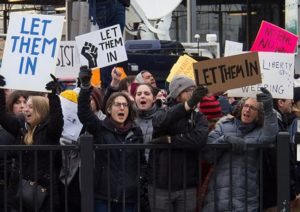Protecting Protest
 Protesters at JFK International Airport in New York City on January 28, 2017 (photo by Rhododendrites via Wikimedia Commons)
Protesters at JFK International Airport in New York City on January 28, 2017 (photo by Rhododendrites via Wikimedia Commons) Protesting has long been a common form of resistance, and lately in the United States we’ve seen popular protests against police violence, pipeline construction, and in response to the election of Donald Trump. The right to peacefully protest is one of our basic constitutional rights as Americans. Let’s recap, shall we? “Congress shall make no law respecting an establishment of religion, or prohibiting the free exercise thereof; or abridging the freedom of speech, or of the press; or the right of the people peaceably to assemble, and to petition the Government for a redress of grievances.” So says the First Amendment of the US Constitution, and the Fourteenth Amendment makes this prohibition applicable to state governments as well.
Without the right to express our discontent with those in office, we would be powerless in a nation where the power was always meant to belong to “we the people.” A great many Americans feel we hit rock bottom when Trump was elected, and they’re motivated now more than ever to ensure their rights and also to push for change. But the recent surge of public organizing and protest has sparked pushback from the conservative Right, whose members in government have begun drafting legislation that would halt protest activity, or at least limit how far protesters can go before facing punishment.
In Washington State, Republican State Sen. Doug Ericksen proposed a bill that would allow protesters to be charged with “economic terrorism” for “attempting to cause economic disruption” by damaging public or private property or by blocking roads.
In January, Denver International Airport enforced a rule requiring protesters to apply to demonstrate prior to appearing there since they are not considered “traditional public forums” according to the US Supreme Court.
Minnesota lawmakers are hoping to pass a bill that would hold protesters financially responsible for the costs of policing the demonstrations. That may sound harsh, but not compared to the bill proposed in North Dakota that would protect motorists who run over and kill protesters obstructing roadways, so long as the running over and killing is an “accident.” And in Iowa, Republican State Rep. Bobby Kaufman proposed what he called the “suck it up, buttercup” bill just one week following Trump’s election to fine state-funded universities for offering space for sit-ins and grief counseling to students and to establish criminal penalties for protesters who shut down highways.
So where does it end? Just as with any other proposed unconstitutional legislation, garbed in dangerous, fear-provoking language, these bills pretend to protect your community and property, but they do nothing but suppress the voices of the people. In a February 4 Washington Post article, the ACLU’s Lee Rowland pointed out that “what these bills have in common is they may be dressed up as being about obstruction or public safety, but make no mistake about it: these are about suppressing protests with draconian penalties so that the average person would think twice before getting out on the street and making their voice heard.”
If there are limits on “how much” or “how far” we can go with protesting, at what point will those limitations stop, and who will make that decision? What will be their opinion of protesters? Will they care about what’s being protested? Are they biased about all of this? These are all important questions to ask when considering who will be making decisions on the limitations of your constitutional rights.
